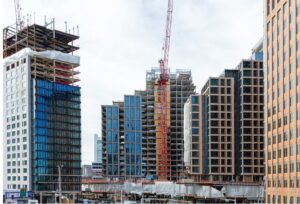Here we go again.
Boston City councilor and apparent mayoral wannabe Michelle Wu has kicked off her not–quite–official-yet campaign with a classic move, calling for the abolition of the decades–old Boston agency that vets new development projects.
It follows the blueprint laid out by other mayoral candidates over the years, including the current incumbent, Marty Walsh, who campaigned on a similar platform, albeit to reform, not axe, the agency.
And like so many critics past and present, Wu, in a 54-page report issued last week, blasted the Boston Planning & Development Agency as an anachronism left over from the 1950s, when the city was a decaying backwater. Instead, Wu would like to see Boston replace the BPDA with a planning board and a planning department more directly accountable to elected officials.
But maybe it’s not the BPDA that is locked in a time warp, but rather the critics of that Boston agency everyone loves to hate, of which Wu is just the latest in a long line.
BRA Helped Rescue City
To read Wu’s report, you would think today’s BPDA is simply a warmed-over version of the neighborhood–demolishing behemoth the leveled the old West End in the 1950s.
The first 10 pages or so rehash the many sins and misdeeds of the agency, previously known as the Boston Redevelopment Authority.
Wu not only condemns leveling of the West End, today widely recognized as a tragedy, but also, oddly enough, the Prudential Center project, which replaced rail yards with what is today the Back Bay’s thriving commercial centerpiece.
The then–BRA’s decision to greenlight the massive project “had lasting impacts,” Wu notes, accurately, before she veers off the rails with a rather odd assessment that the agency was wrong in “prioritizing one big-name project at the expense of coherent and democratic citywide planning.”
Could it be possible, that at a time when Boston was still a dingy, declining backwater, with a reputation for ferocious political corruption, focusing on one, big transformative project wasn’t such a bad idea – especially given the results?
In the early years, the agency provided a buffer between a city known for its rampant political corruption – epitomized by Mayor Michael Curly, the king of graft, who spent five months of his fourth term in the federal slammer for mail fraud – and major investors and corporations interested in development opportunities, but fearful of getting shaken down.
For all its faults, Boston’s quasi-independent development agency played a crucial role in fostering a boom that catapulted the city from a corruption-riddled backwater back into the front ranks of the world’s great urban metropolises.
Over the past five decades, tens of billions of dollars in new towers, parks, labs and entirely new neighborhoods have taken shape across the city.

The Boston Planning & Development Agency provides a buffer between NIMBY-dominated neighborhood politics and projects that add much-needed housing to the city, a buffer which would be hard to replace if the agency were abolished.
What Wu Gets Right
It’s not that Wu’s report doesn’t have any good ideas – her report is chock full of suggestions that would make the city’s development arm both function more effectively and be more transparent as well.
Boston could certainly use more as-of-right zoning, removing the need for the BPDA to roll out special “planning development areas” every time a developer proposes a new project.
Wu also nails it when she describes the way the agency’s independence has, over the years, created “unwritten rules” that only a few, privileged builders understood – an unhealthy breeding ground for backroom deals and sometimes even outright corruption.
More than one power-hungry mayor has used the agency to hold sway over development in Boston in near–dictatorial fashion.
“The BPDA gives concentrated control over development to the mayor of Boston with little to no accountability, giving well-connected developers outsized access to influence decision-making and incentivizing an unhealthy political interdependence,” Wu notes.
An Electoral Weapon Only?
If Wu were to use her rising public profile and her platform on the Boston City Council to make reforms to the agency, she could probably make a real difference.
But Wu instead seems intent on pursuing a complex strategy to shutter the agency, the old white whale pursued so fruitlessly by so many critics and politicians across the decades.
Then again, maybe Wu isn’t interested so much in shutting down the BPDA as she is in using it as a cudgel with which to hammer away at Walsh in advance of a run.
For aspiring mayors, the city’s development agency has long proved a valuable whipping post.
In her report, Wu relies heavily on the findings of the extensive audit that Walsh, with reform in mind, ordered up after he won election back in 2014.
The audit provided a motherload of political dynamite to critics of the BPDA, from millions of dollars in rent never collected agency–owned properties on to sweetheart deals that let favored developers off the hook for millions more in affordable housing requirements.
Yet Wu gives short shrift to the changes Walsh made in the audit’s wake, ridiculing them as simply changing the agency’s name and appearing to suggest that it is still business as usual at the ex-BRA.
Agency an Anti-NIMBY Buffer
Still, given the BPDA’s somewhat checkered history, why not replace it with a planning department and a planning board?
As the city has grown more prosperous and vibrant, corruption certainly hasn’t disappeared but it doesn’t pervade everyday economic and political life like it once did.
The agency’s role has also evolved, and now it provides a useful – maybe even indispensable – buffer between NIMBY-dominated neighborhood politics and the developers and investors interested in putting their dollars to work in the city.

Scott Van Voorhis
In communities across Massachusetts, the same local planning boards Wu envisions as a model for Boston have shown themselves to be utterly incapable of standing up to their loud-mouthed, NIMBY constituents.
It’s a big reason the Bay State is starved for new housing right now. And it’s in stark contrast to Boston, where thousands of new condos and apartments are coming online in a city that, in contrast to many rapidly greying towns and suburbs across Massachusetts, is growing again as it adds tens of thousands of new residents.
Does Wu really want Boston to follow the lead of Wellesley, Weston or Winchester?
If she thinks condo prices and apartment rents are bad in Boston today, she should wait until her new, suburban-style planning board takes charge.
Scott Van Voorhis is Banker & Tradesman’s columnist; opinions expressed are his own. He may be reached at sbvanvoorhis@hotmail.com.




 |
| 


